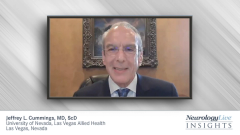
Unmet Needs and the Future of Treatment for AD
Jeffrey L. Cummings, MD, ScD, comments on the unmet needs and future outlook for the Alzheimer’s treatment landscape.
Jeffrey L. Cummings, MD, ScD: Aducanumab makes new demands on our health care system. It makes new demands on neurologists and primary care practitioners. It makes new demands, but also new opportunities for patients. We must also remember that it makes new demands on the patient’s caregivers. The patient may have to be taken to an infusion center. They will have to be taken for multiple MRIs as aducanumab is introduced. One of the principles that’s so important as we go forward with these new drugs is a shared decision-making model, where the neurologist informs the patient and their caregivers of the risk and benefit, and a shared decision emerges about whether this patient is appropriate for aducanumab, whether they can adhere to the treatment requirements, and when the drug should be stopped, because it’s likely not to continue to be useful.
As we look forward to the emergence of new tests for Alzheimer’s disease, I’m particularly excited about the emergence of blood-based biomarkers. We already have the ability to measure amyloid, tau, and neurofilament light, an indicator of neurodegeneration in the plasma. We’re making tremendous progress. Only 1 of those is available on the market, the amyloid beta measures, but I’m sure that within 12 to 24 months, we’re going to see the approval of tau measures and neurofilament light in the blood. That’s going to allow us to make diagnostic and therapeutic decisions that will be very beneficial for the patient, because we can do them relatively readily. They could be done by a primary care practitioner. And if they’re positive, then the patient would be referred to a neurologist for further decision-making. We have great unmet needs in terms of biomarkers, but we’re making steady progress in terms of the blood-based biomarkers and advanced imaging, which will be helpful in the diagnosis and treatment of Alzheimer’s disease.
This transcript has been edited for clarity.
Newsletter
Keep your finger on the pulse of neurology—subscribe to NeurologyLive for expert interviews, new data, and breakthrough treatment updates.











